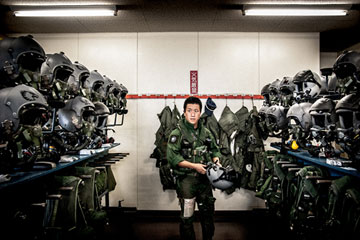
These days, Japanese pilot Kohta "Vader" Araki, who flies F-15s, is always on alert.
(5 of 7)
With his soft face and panda-set eyes, Abe, 59, is known as an obotchan, which roughly translates to "little boy," referring to his privileged lineage as the son of a Foreign Minister and the grandson of a Prime Minister. Nepotism flourishes in Tokyo's halls of power, but Abe seems especially weighted with a sense of his conservative family's mission, particularly his grandfather Nobusuke Kishi's desire to amend Article 9 of the constitution, which is read as banning Japan from possessing an offensive military force. "From a young age, Abe had it in his mind that he would be the one who would bring the postwar regime to an end," says Hitoshi Tanaka, a former Deputy Foreign Minister.
Abe's sense of history and destiny for Japan backfired for him during his first stint as PM. "Abe misread the public mood about nationalism," says Koichi Nakano, a politics professor at Sophia University in Tokyo. "People were more concerned about the economy, and he focused on the wrong thing." Abe's popularity plunged, even as he pursued a patriotic agenda and supported a textbook that played down Japanese wartime atrocities. A year after taking office, amid financial scandals involving his Cabinet members, Abe resigned in tears. He later blamed a rare intestinal ailment for his retreat.
In his 2.0 version, he continues to sound the nationalist bell. In 2012, he visited the controversial Yasukuni Shrine, where Japan's war dead, including top war criminals, are memorialized--although he has so far declined to worship there while serving as Prime Minister. (Abe's grandfather Kishi was arrested as a suspected war criminal by Allied occupation forces but never charged.) During last year's political campaign, Abe suggested the need to revise two official Japanese apologies for the nation's cruel wartime record, including one for the imperial Japanese army's systematic sexual enslavement of Asian "comfort women."
This time, however, Abe's popularity is high. About 7 in 10 Japanese have a favorable opinion of him, according to a July Pew poll--unusually robust in a nation that serially dumps its leaders after brief periods in office. In May, a self-assured Abe was even moved to clamber into the cockpit of a Japanese military jet and flash a thumbs-up sign. The resulting image wasn't quite Michael Dukakis in a tank. But the notion of Abe as proud commander in chief felt forced--and it didn't help neighborly relations that the jet trainer chosen for the photo op was numbered 731, the same digits as a notorious Japanese military unit that unleashed germ warfare on Manchuria.
Anti-Chinese sentiment is soaring in Japan. Nevertheless, a significant percentage of Japanese remain allergic to any military buildup, particularly those who personally experienced the ravages of war. Only a minority of Japanese support constitutional revision. There is also a grudging understanding that Japan--especially an aging, depopulating Japan--needs China economically far more than the other way around. "Our biggest national interest is reviving our economy, and Japan is not in a position to be isolated by this question of [wartime] history," says former Deputy Foreign Minister Tanaka. "I am very concerned about these careless right-wing statements by people inside government."
